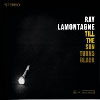RAY LAMONTAGNE : TILL THE SUN TURNS BLACK
- Be Here Now
- Empty
- Barfly
- Three More Days
- Can I Stay
- You Can Bring Me Flowers
- Gone Away from Me
- Lesson Learned
- Truly, Madly, Deeply
- Till the Sun Turns Black
- Within You
Label : 14th Floor Records
Release Year : 2006
Length : 48:19
Review (AllMusic) : If it weren't for his singing voice, so full of smoke and ether, one would be hard-pressed to believe that Till the Sun Turns Black was made by the same man who recorded Trouble just two years prior. Ray LaMontagne takes a brave leap from the rootsy singer/songwriter material of his debut album and does a 180. Once more collaborating with producer and multi-instrumentalist Ethan Johns, the singer-songwriter turns in a highly textured, atmospheric, and subdued performance on his sophomore effort. All the grit and earth in LaMontagne's voice on Trouble, and the basic country-folk and R&B (on the title track) has been swept out like ashes in the morning here. This new set is startling. The reliance on skeletal, delicate string arrangements adds much to the interior nature of these songs. LaMontagne has used the projection in his lyrics and his voice and turned them inside out. He's slower, more subtle, more restrained everywhere here. His lines are economical, full of space and tension, as if they were being performed alone in a room in the middle of the night. Johns' use of strings and keyboards paints LaMontagne's voice and underscores his delivery with a quiet drama that reveals itself inside the listener. Check LaMontagne's opener, "Be Here Now," with the guitar finding its way toward the singer as a quartet of violins, two cellos, and a bowed bass emerge to support his voice in the void of silence Johns creates around it. Johns' piano fills in odd spaces. They don't seem to add up, but they do when LaMontagne's vocal whispers its way forward into that small swelling shadow. On the bluesy "You Can Bring Me Flowers," a horn section is used to highlight and extol LaMontagne's tough lyrics; but there is more Tim Buckley and Tom Rush here than Otis Redding or Sam Cooke, but it's all LaMontagne. The jazzy flute and funky dobro don't sound like country, but more like country-blues from an earlier time. By contrast, the whispering acoustic guitars and strings in the title cut are frames to fit a voice inside, and LaMontagne's does; then shatters it when confessed emotion blurs then shatters the edges. These are songs no one else can sing. LaMontagne's sense of phrase and rhyme are idiosyncratic, never overbearing; he allows the listener into his world, slowly, deliberately; his observations and nearly overwhelming emotion are too big to keep to himself -- as the strings swell, all he can do is moan, then nearly growl, wordlessly. Till the Sun Turns Black is a giant leap forward. LaMontagne reveals himself to be a sophisticated pop artist who can find in simple forms something utterly engaging and communicative. This record could have been made 20 years ago but in another two decades will still sound fresh.
